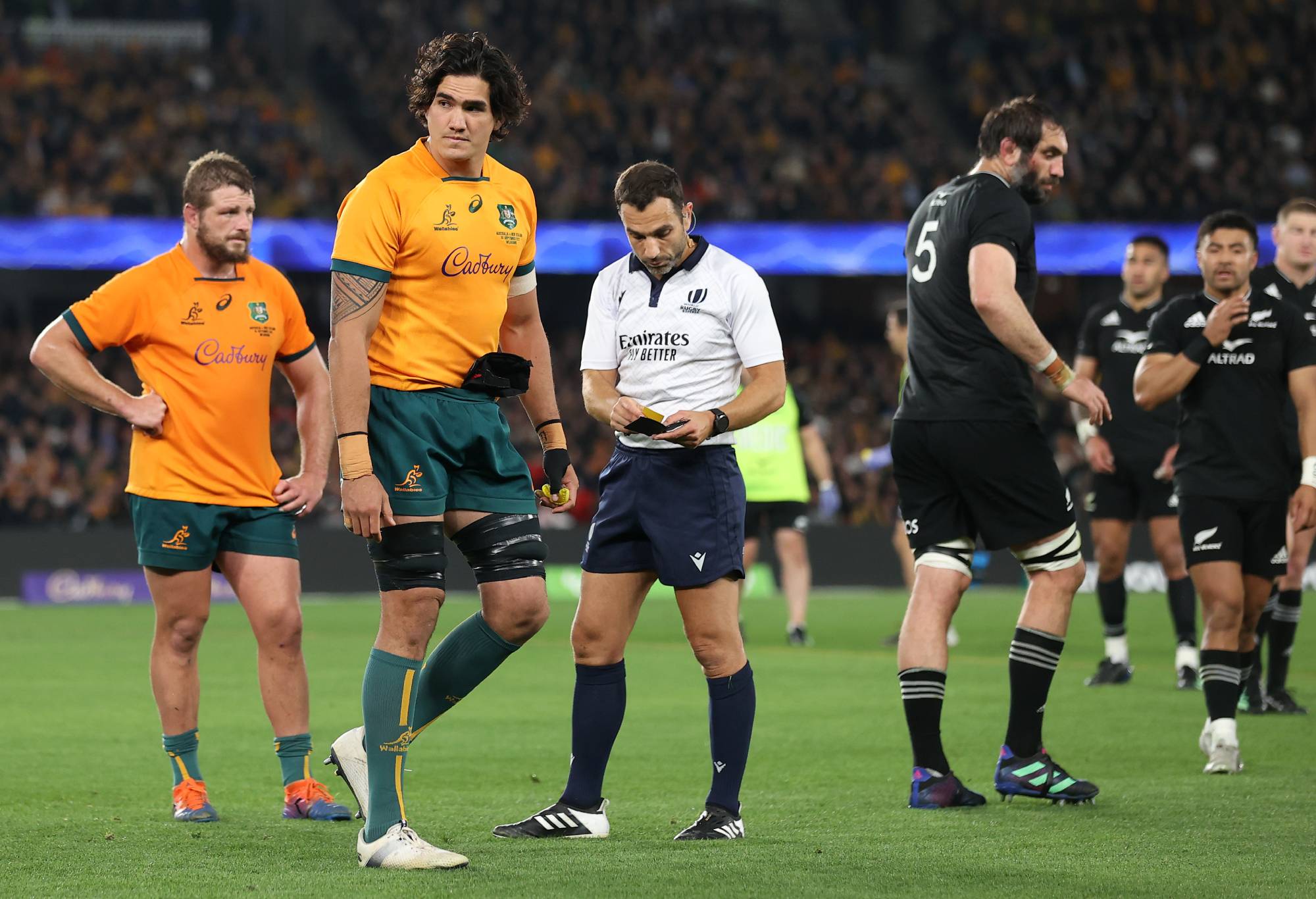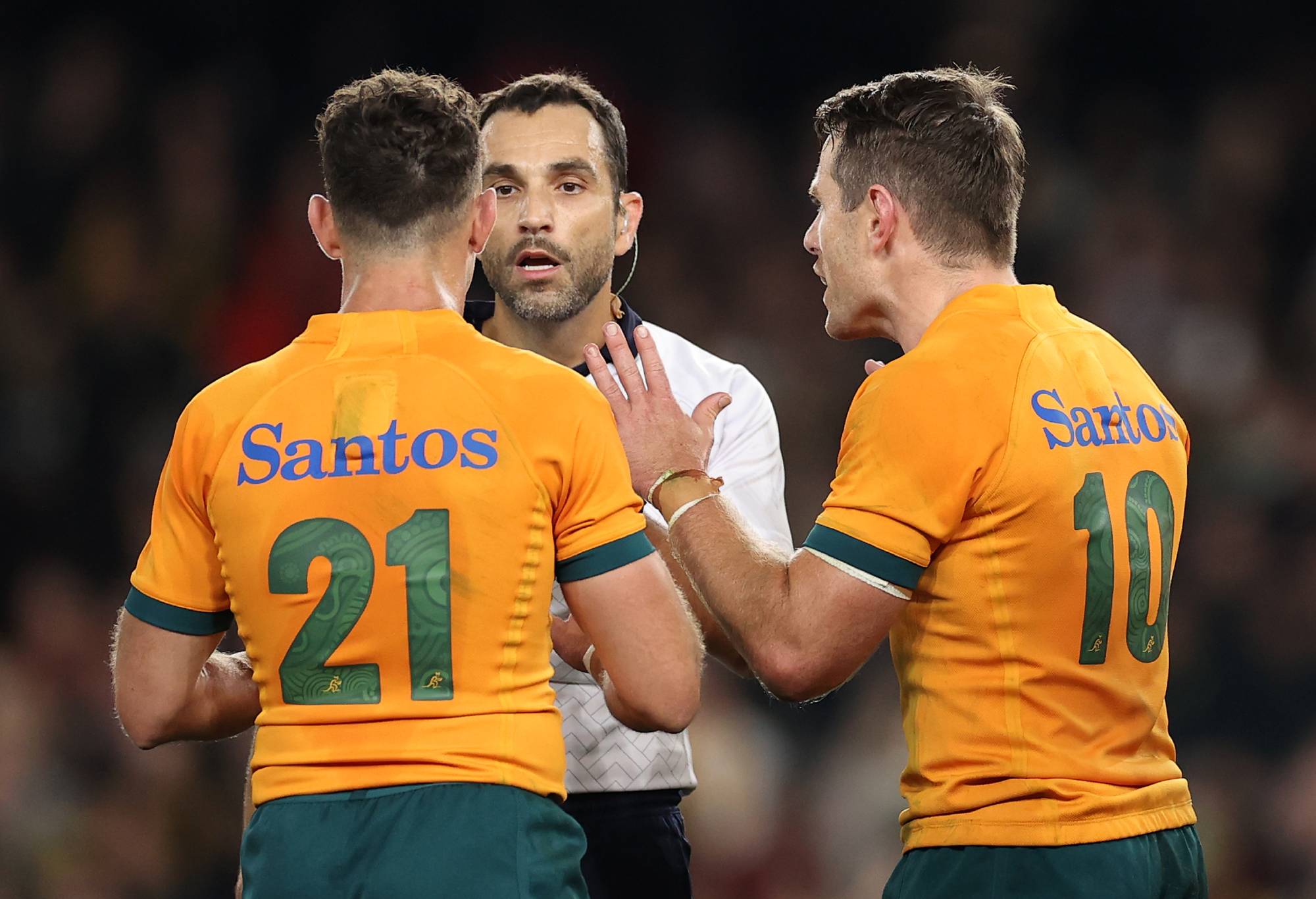Darcy Swain has taken over from Quade Cooper as New Zealand Rugby’s public enemy number one after he injured All Blacks rival Quinn Tupaea during Thursday’s epic clash in Melbourne.
Swain received a yellow card moments after coming onto the field in the second half when he got it all wrong at a maul and drove his shoulder through Tupaea’s knee causing damage that will keep the Kiwi out of action for the rest of the year.
Swain was cited over the incident on Friday and, following his red card against England for headbutt, could face a second extended ban this year.
New Zealand coach Ian Foster was livid about the action which ruptured Tupaea’s MCL and will sideline him for the rest of the year.
He was asked if Swain should have received a red card but side-stepped the question, while leaving no doubt over his feelings.
“We’ve got a big issue with it. You’re not allowed to target legs on the side at a clean out past the ball, so the rules are pretty clear,” said Foster.

Darcy Swain of the Wallabies leaves the field after receiving a yellow card. (Photo by Cameron Spencer/Getty Images)
Wallabies coach Dave Rennie felt Swain shouldn’t have even received a yellow.
“I’m not convinced … it was certainly nothing intentional,” Rennie said.
Speaking on The Breakdown Podcast, All Blacks legend Jeff Wilson said he understood Rennie’ backing his player but added: “The reality is we have a player who is sidelined due to a an illegal action, a careless and reckless action.
“He may not have meant to to do it but there was no way anything but an injury was going to come about.
“He wasn’t even coming from a legal position to clean out.”
Wilson asked his podcast co-host – Kiwi broadcaster Nate Rarere for his reaction.
“Bro, right on the side of the knee joint. He didn’t have to come in there,” said Rarere.
“It’s a game where yes there’s aggression and physicality … but there’s a point of care. That’s not care.
“I thought it was grubby, I thought it was dirty. I thought he knew exactly what he was doing. Maybe he didn’t intend to ruin this guy’s ligaments. But he had no business being in there. I’m thinking it’s easy eight weeks for me.”
Wilson said Swain has history.
The Roar’s Brett McKay, Harry Jones and Jim Tucker discuss a crazy Bledisloe I in our Instant Reaction Podcast
“This is a behaviour of being reckless so you’d expect the book is thrown at him,” said Wilson. “The one thing we do know with the judiciary is there’s no consistency so we have no idea.
“I wonder if there’s a course he can do to reduce it down,” Wilson added, in a reference to SANZAAR’s approach to high contact red cards.
“I’m fascinated to see how this plays out. By the same token, I’d love to see him running out at Eden Park. Talk about a villain. Imagine when his photo comes up on the big screen.”
Rarere added: “I want an annoying dude out there. I understand why Darcy Swain comes out to be the bully and the physical thing but that’s full on grub.”
Swain is alleged to have contravened Law 9.11 which states players must not do anything reckless and dangerous to others.
The case is to be considered by the SANZAAR Foul Play Review Committee which will take place on Monday via video conference.
Swain aside, Wilson and Rarere gave the Australians their due for their impressive comeback, halted by a controversial refereeing call from French whistler Mathieu Raynal.
“I don’t want to take anything away from the Wallabies performance because for 79 minutes they stayed in the fight,” Wilson said. “When they were down 31-13, a position where you never expect the All Blacks would allow an opposition to get back from.
“They showed some signs of things we knew they were capable of but didn’t expect them to do against the All Blacks.
“Now I think we come to Eden Park and even though the Bledisloe Cup’s not on the line the stakes have got very high. They’ll want to deny us the Rugby Championship. They’ll want to break the hoodoo. For the Wallabies, this is the best possible result other than winning.”
Raynal’s decision dominated the fall out on Friday.
Grant Chapman, writing for NewsHub, said the Wallabies failed to heed a warning from Raynal and got what they deserved.
“The archrivals battled out another classic trans-Tasman contest, but you get the feeling the Aussies will grizzle about the three yellow cards – two of them concurrent – and controversial ending for some time to come,” he wrote.
“Cynics may suggest that French referee Mathieu Raynal was New Zealand’s best on the night, but he had certainly warned the Wallabies for time-wasting in a stop-start contest that seemed designed to disrupt any All Blacks continuity.”
Marc Hinton, writing on stuff.co.nz argued the decision was “unduly harsh”
“There is a lot to unpack from one of the most dramatic Bledisloe Cup Tests in history, but the chief takeaway has to be that the All Blacks, with a little help from the referee, found a way to win a match that looked for all money to have slipped from their grasp,” he wrote
“Well, that and the, yes, wonderful Wallabies were exceedingly unlucky not to have pulled off one of the great comeback victories in their history, denied at the finish by a stickler referee who pulled out one of the most seldom used laws in a very complicated book.
“You had to feel for the Wallabies, who had come storming back to close a 31-13 second-half deficit in the final quarter, and put themselves in the box seat in the dying minutes to clinch a famous upset that would have given them, not just a shot at the Bledisloe heading to Auckland, but also the Rugby Championship.”
Gregor Paul, writing in the New Zealand Herald, praised the All Blacks for ruthlessly capitalising on the refereeing decision to run in a winning try by Joride Barrett.
“It wasn’t always easy to tell where the All Blacks’ heads were at during their epic Bledisloe win, but in the final minute, when they were dramatically and sensationally awarded a scrum five metres from the Wallabies try-line, they were mentally in precisely the right place,” Paul wrote.

Referee Mathieu Raynal speaks to Nic White and Bernard Foley of the Wallabies during The Rugby Championship & Bledisloe Cup match between the Australia Wallabies and the New Zealand All Blacks at Marvel Stadium on September 15, 2022 in Melbourne, Australia. (Photo by Cameron Spencer/Getty Images)
“The instant referee Mathieu Raynal made what many believe was an unprecedented decision to penalise the Wallabies for time-wasting with just one minute of the game left, the All Blacks’ leaders were huddled and planning.
“They made a couple of smart realisations – the first being that the referee was not to be trusted and the second, was that a draw was no good to them and therefore a dropped goal was off the table.
“The plan was therefore hatched to get the ball out of the scrum as quickly as possible and to then commit the Wallabies defence to the middle of the field by using the forwards to pick and drive until there was an opportunity to exploit the inevitable space out wide.”
All Blacks flyhalf Richie Mo’unga said the team didn’t want to leave “anything up to chance with the ref around the scrum.’
“We wanted to get the ball in and out and impose ourselves on them. We did exactly that and we ended up getting the advantage which gave us a licence to have a free crack.”
The New Zealand players had never seen a decision for time wasting in those circumstances but were pleased the ref acted.
“I haven’t seen it, but I also applaud him,” said Brodie Retallick. “He was telling them to play the ball and to hurry and I guess I applaud him for making a big call in a moment like that because I guess it wasn’t easy.”
The decision garnered world wide headlines.
Former England international Stuart Barnes, writing in The Times, it an example of “abject stupidity.”
“The match in Melbourne between Australia and New Zealand had it all,” he wrote.
“Thrills, spills, great tries, moments of aberration – but more than anything else, it will be remembered for a decision made by the referee, Mathieu Raynal, that will forever be regarded somewhere between the worst and most bizarre that international rugby has yet to witness.
“It almost certainly cost Australia a rare win against their great rivals.
“Foley was doing what any kicker in the world would do, setting himself to make sure he didn’t slice the ball in field and, yes, taking another five or ten seconds up. He wasn’t cynically ending the contest.
“Yet this wasn’t even an obvious example of time-wasting. He had started his kick-clearance routine when the whistle metamorphosed a probable match-sealing kick to touch into a match-losing scrum, with New Zealand set to salvage the game in the final plays. Foley wasn’t ambling around with his back to the referee. He wasn’t snubbing authority.
“Whatever the laws or sub-laws of the game claim, here was a refereeing decision of abject stupidity.
“There was nothing worthy of turning the momentary delay of Foley into an exhausted act of madness.”
Robert Kitson, writing in the Guardian said Raynal’s decision “obscured the fact that the All Blacks remain distinctly mortal. Yes, they sneaked it at the last. But the majority of their points came when the Wallabies were reduced to 13 or 14 men and at no stage did the All Blacks look remotely back at the peak of their powers.
“Clearly there is still time to tinker selection wise but it is in the crucial areas of tactical nous and clear thinking that New Zealand, once past masters at both, are currently diminished.”






























































































